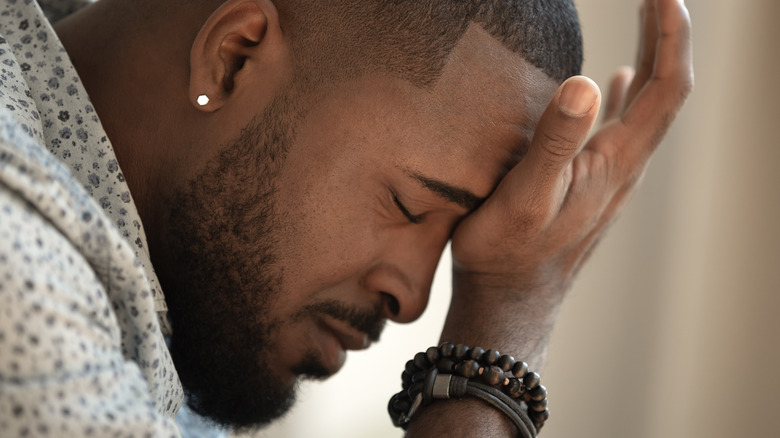A Concussion Can Be Worse For Your Brain Health Than You Think
Every year, millions of people in the United States experience a traumatic brain injury (TBI), including concussions (via Johns Hopkins Medicine). The U.S. Centers for Disease Control and Prevention (CDC) states that concussions occur due to "a bump, blow, or jolt to the head or by a hit to the body that causes the head and brain to move rapidly back and forth." While concussions are generally not life-threatening, they're considered serious.
Car accidents, sudden falls, and assault are all common causes of concussions (via Johns Hopkins Medicine). Youth are particularly susceptible to concussions, as many engage in contact sports, making them more vulnerable to injury (via WebMD). Between 2010 and 2016, the CDC estimated that 283,000 kids were brought to the emergency room annually for a concussion due to sports injury.
Signs of a concussion include dizziness, headache, nausea, difficulty walking or thinking, impaired memory, and vision problems, among others (via Johns Hopkins Medicine). Depending on the severity of the impact, symptoms are often experienced immediately after the fact. However, in some cases, symptoms may not be felt until weeks or months after. Now, new research suggests that the effects of a concussion may be even more long-lasting.
Concussions can affect cognitive abilities up to a year later
A 2022 study published in the scientific journal Neurology examined 656 patients over the age of 16 who had been admitted to hospitals within 24 hours of head trauma. They compared them to another group of 156 people with no instances of traumatic brain injury to understand how concussions impacted the patients' cognitive outcome one year later, which the researchers defined as some level of "cognitive decline" or "cognitive impairment."
Patients were issued cognitive tests to assess things like memory and language skills. Researchers measured performance at two weeks, six months, and a full year after the injury (via HealthDay). After one year, 14% of patients with concussions were found to have poor cognitive outcomes, as opposed to only 5% of those in the control group without concussions. More specifically, 10% of concussed patients experienced cognitive impairment, 2% experienced cognitive decline, and 2% were found to have a combination of the two.
Doctors seek to understand risk factors better
The study findings also showed that those with concussions and poor one-year cognitive outcomes were more prone to psychological distress and reported a reduced quality of living (via Neurology). Additionally, hyperglycemic concussion patients, patients of lower-income status, those without health insurance, or those having experienced depression before the injury were more highly associated with poor one-year cognitive outcomes.
Study author Dr. Raquel Gardner spoke in a news release about how these findings have the potential to positively alter the mental health outcomes of future concussion patients, stating via HealthDay, "Previous studies of people with moderate to severe brain injuries show that early, intensive rehabilitation can improve people's cognitive outcomes over time." She also suggests more research needs to be done to understand how rehabilitation can help people of various levels of brain injury and who may be at a greater risk of poor outcomes.



